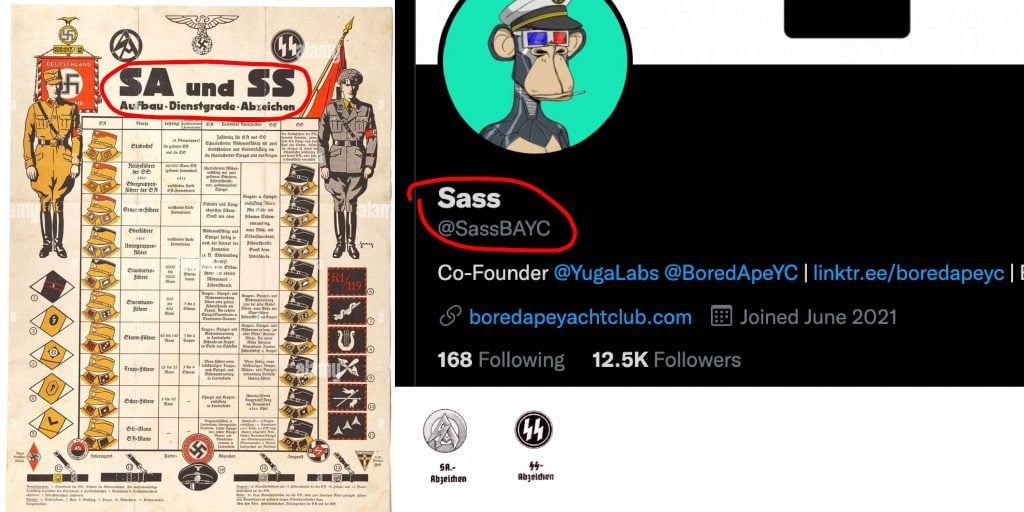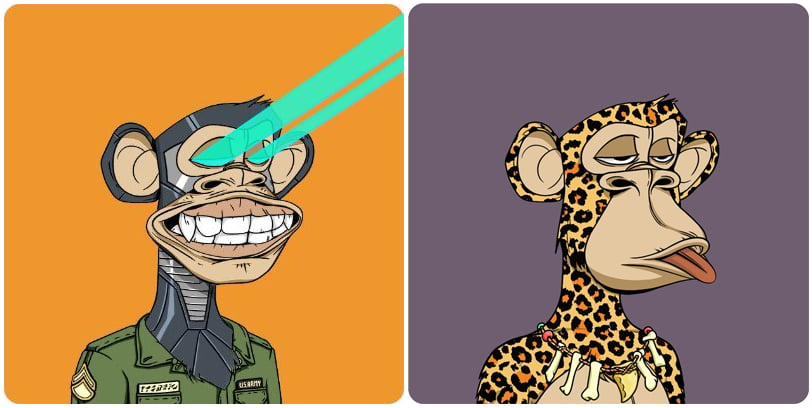In a case that promises to be one of the most hotly watched in the crypto art space, Yuga Labs, the creators of the wildly popular Bored Ape Yacht Club (BAYC) series of NFTs, is suing the artist Ryder Ripps, claiming that he is infringing upon their brand, trademark and intellectual property. Ripps, meanwhile, maintains that the company is attempting to silence critics like him.
The case stems from a copycat collection of NFTs called Ryder Ripps Bored Ape Yacht Club (RR/BAYC), which Yuga Labs says is part of a smear campaign Ripps has been waging online, including what it called false accusations that the origins of BAYC are connected to Nazi imagery.
Ripps is the owner of gordongoner.com, a website named after one of the co-founders of BAYC, on which Ripps posts examples of what he and a handful of others says are the “dehumanizing” elements of BAYC NFTs. Ripps says the works draw on “traits that indicate that they are intended to represent Black people and Asian people… equating them to monkeys,” and that the creators of BAYC have been “intentionally embedding Nazi dog whistles throughout their project.”
The information Ripps gathered mostly includes symbols and imagery that he says is gleaned from the history of alt-right/4chan groups involved in crypto. One such image is the BAYC logo, which Ripps says is similar to the Nazi Totenkopf emblem.

In an online post, Ryder Ripps points out the similarities between the BAYC logo and the Nazi Totenkopf emblem. Photo: courtesy of Ryder Ripps.
Ripps says even the pseudonyms the founders of BAYC use online are based on racist terms. One of them, Gargamel, is a name allegedly taken from “a character from the Smurfs who is acknowledged as an antisemitic depiction of a Jewish person,” Ripps says. He also says that the Twitter name of another co-founder, SASS, is an alleged amalgamation of the Nazi Party’s paramilitary security forces, the Sturmabteilung (SA) and the Schutzstaffel (SS).
Some in the industry seem to agree. Alex Fazel, co-founder of the investment app Swissborg, said in a recent Twitter post: “Some twisted stuff in this story and very unusual ‘coincidences.’ I’m not accusing anyone yet.” Cory Klippsten, of Swan Bitcoin, added that he believes BAYC NFTs contain problematic references. “I’d put it at 99.99% the project is in fact a deliberate troll, intentionally replete with Nazi symbols and esoteric racist dog whistles.”
Yuga Labs says in its lawsuit that Ripps is actually using his social media clout to coordinate “a campaign of harassment based on false accusations of racism,” while using the controversy to “fuel sales of the fake RR/BAYC NFTs.”
In May 2022, Ripps launched an NFT collection that uses the same images, logos and marks owned by BAYC to promote and sell versions of his copycat works on marketplaces such as Foundation and OpenSea. Ripps’s version of BAYC sold 10,000 NFTs at 0.15 ETH each, netting him an estimated $1.8 million in profits. Yuga Labs calls these “ill-gotten” gains, and said they hope to receive the same amount in damages, as well as an injunction preventing Ripps from using any images or trademarks associated with BAYC.
In an email sent to Artnet News, Ripps says that for the past seven months, Yuga Labs has been involved in a concerted effort to silence him and other critics. “The lawsuit grossly mischaracterizes the RR/BAYC project,” he says. “People who reserved an RR/BAYC NFT understood that their NFT was being minted as a protest against and parody of BAYC, and no one was under the impression that the RR/BAYC NFTs were substitutes for BAYC NFTs or would grant them access to Yuga’s club.”
“I have been creating NFT artwork for the past year that scrutinizes the purpose, meaning, and social import of NFTs,” he added.

One of the co-founder of BAYC goes by the alias SASS online, which Ripps claims is a combination of the abbreviations for the Sturmabteilung and the Schutzstaffel, the Nazi Party’s paramilitary security forces. Photo: courtesy of Ryder Ripps.
Yuga Labs Strikes Back
In an open letter published on June 24, Gordon Goner and the other founders of BAYC respond to Riffs theories. Describing Ripps as a “demented troll,” they characterize his accusations that the founders are secret Nazis as a “crazy disinformation campaign.”
The lawsuit, filed last week in U.S. District Court for the Central District of California, also lays the groundwork for responding to what legal experts say could be a fair use defense by Ripps.
The artist claims on his website that minting exact replicas of Yuga Labs’ Bored Ape NFTs and reselling them at a profit is an example of “satire and appropriation.” Before purchasing a RR/BAYC NFT, buyers agree to terms on Ripps’ site that state: “you understand that it is a new mint of BAYC imagery, re-contextualizing it for educational purposes, as protest and satirical commentary.”
The lawsuit goes on to allege that Ripps is “scamming” buyers with fraudulent NFTs, describing the project as a “deliberate effort to harm Yuga Labs at the expense of consumers.” The lawsuit concludes that “copying is not satire, it is theft. And lying to consumers is not conceptual art, it is deception.”
In a statement released on Twitter, Yuga Labs says, “We will continue to be transparent with our community as we fight these slanderous claims. In order to put a stop to the continuous infringement, and other illegal attempts to bring harm to us and the BAYC community, we have filed a lawsuit against the responsible parties. We will continue exploring and pursuing all legal options at our disposal.” The company is seeking a jury trial.
According to University of Kentucky Rosenberg College of Law intellectual property professor Brian Frye, Yuga Labs appears to have a solid case for trademark infringement. “Just because it’s conceptual art, doesn’t make it non-infringing,” he says on Twitter.
Frye told Artnet News he believes this case will be an important one. “There’s a lot that makes this case interesting,” he says, speculating that the real motivation behind the lawsuit is Ripps’s criticism of the project’s seemingly neo-Nazi origins. “They really want Ripps to agree to stop criticizing them,” he says, adding that he “fears the horse is out of the stable there. If Ryder Ripps’s criticisms get traction, others are entitled to levy them, and Yuga risks a litigation ‘Streisand effect’ amplifying Ripps’s message.”
NFTs, Appropriation and the Law
This is not the first time NFTs have entered tricky legal territory. In 2021, the artist Shl0ms assembled the logos of all Fortune 100 companies into a registered trademark sign, writing in the description of the project that “in the event that this NFT does become the first to be the subject of a cease & desist letter from a major corporation, it will only skyrocket in both historical importance and value.”
In a similar vein, a French artist group called Distributed Gallery announced in 2018 that they would be launching a crypto-currency purportedly conceived by artist Richard Prince, entitled Ready-Made Token. The work consisted of a single Ethereum token that attempted to alter “the status of crypto-currencies: from an exchange medium to an exclusive artwork,” according to Distributed Gallery’s website. “With this gesture, Richard Prince questions what money is, puts the lights on the beliefs it relies on and its links to the art market.”
Although the project was eventually revealed to be fraudulent, and Prince’s involvement in it invented, it brought up some interesting questions about the nature of appropriation in the NFT space.
The problem, it seems, is that there are currently no legal standards when it comes to trademark or copyright protection in conjunction with NFT marketplaces, nor with NFTs themselves. Most cases involving potential infringement are brought forth via the Digital Millennium Copyright Act, which prompts marketplaces such as OpenSea to take down items if there are concerns about their authenticity.
That was the case involving the project NFT Theft, which initially lured buyers to purchase works by well-known artists that turned out to be fakes. Later, NFT Theft announced that their entire project was designed as a massive publicity stunt, a kind of conceptual exercise involving questions around authorship and ownership in the emerging digital economy.
A similar thing happened with Ripps’s BAYC NFTs. A few days after they were listed on the Foundation marketplace, Yuga Labs issued a DMCA takedown request, according to Ripps, and the works were removed. But the company withdrew its request two hours later. “The current terms of ownership set forth by Yuga Labs to BAYC token holders are unclear and do not meet current copyright standards,” Ripps says on his site. “Clearly defining what we are buying when we purchase an NFT is one of the primary goals of this work.”











